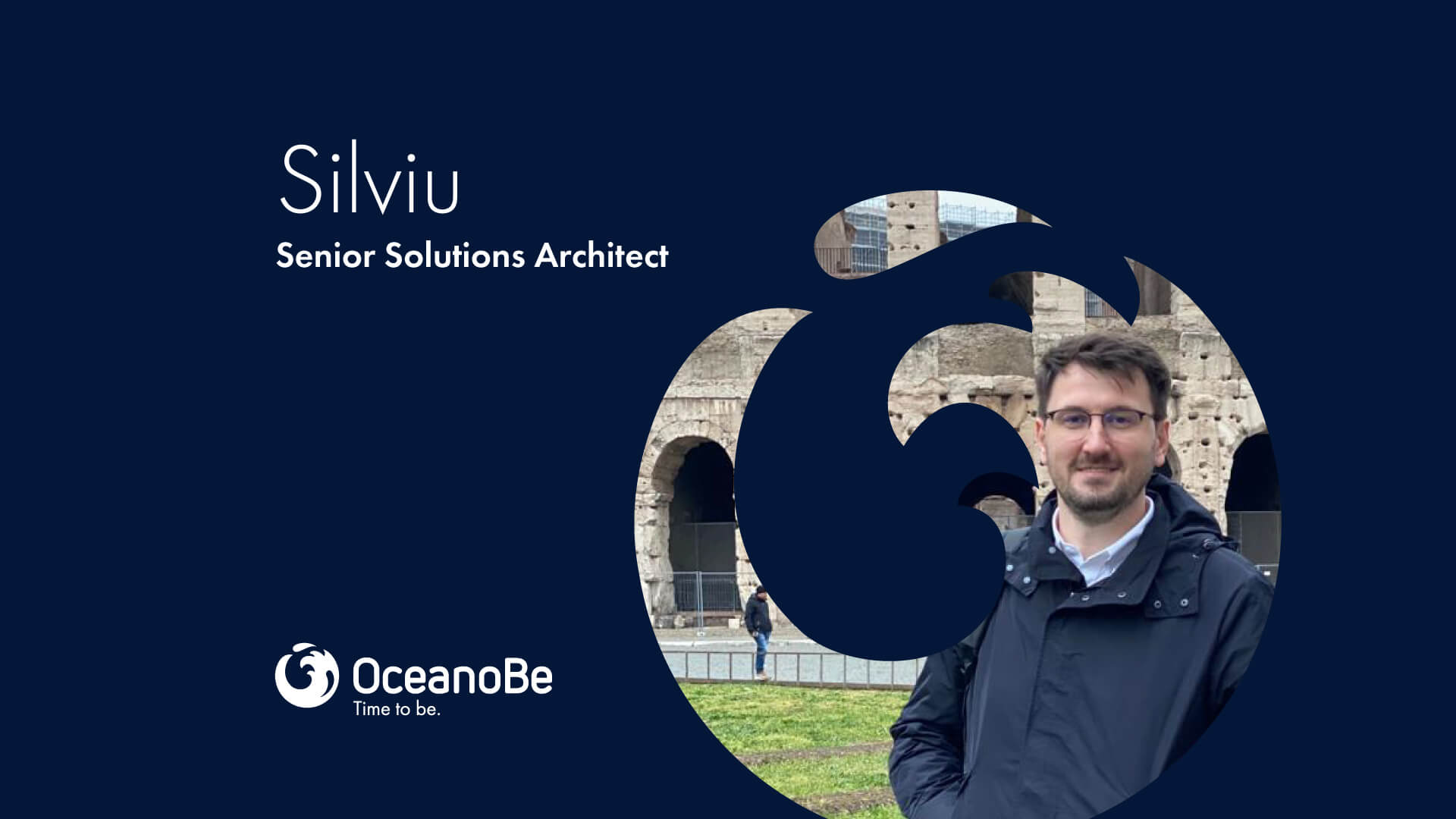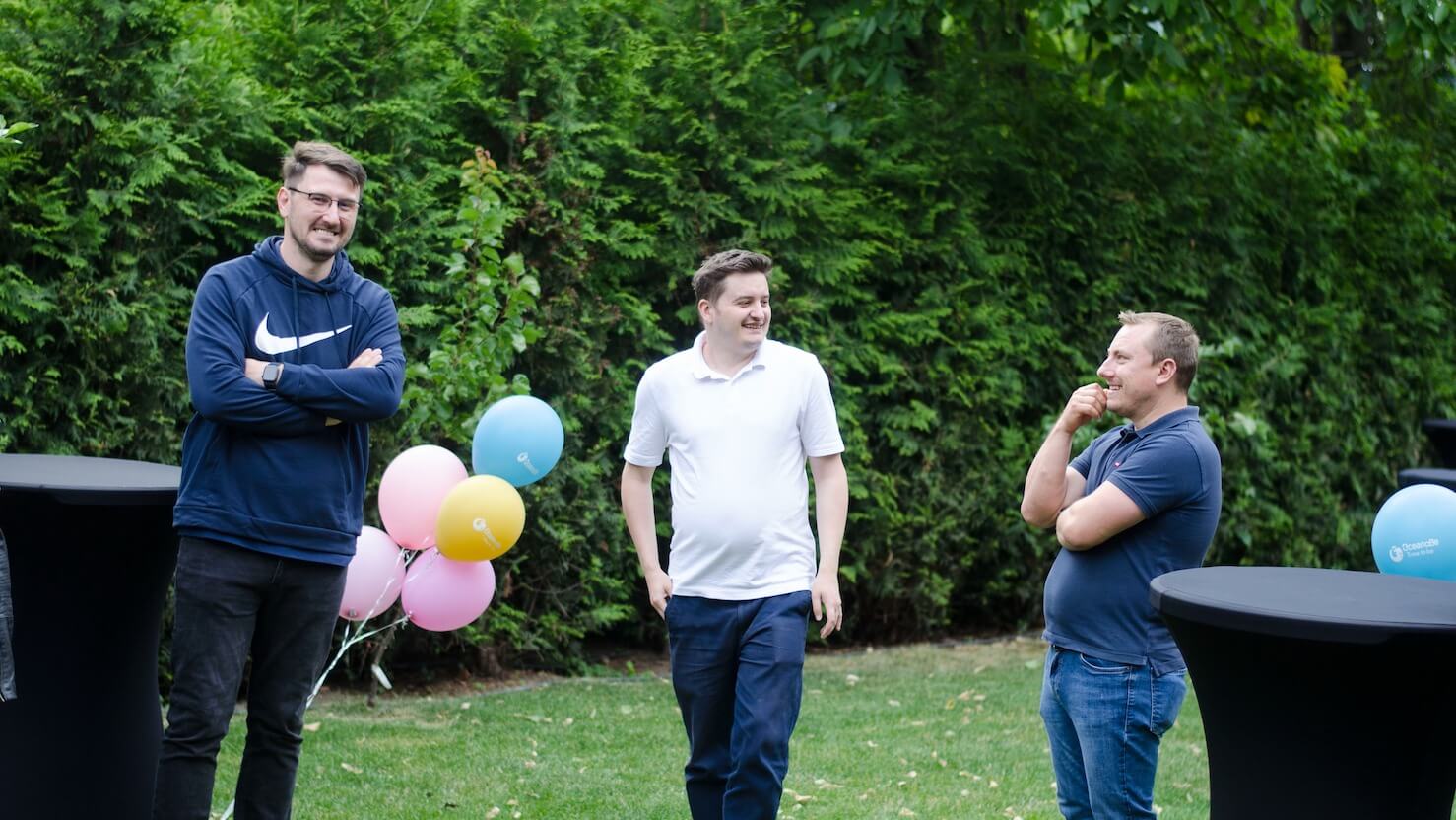The road to experience from our Senior Solutions Architect
Alina interviewing Silviu, Senior Solutions Architect
Alina interviewing Silviu, Senior Solutions Architect

Silviu, Senior Solutions Architect at OceanoBe
In this interview, we are talking about the road of experience and lessons learned with Silviu, Senior Solutions Architect with 14+ years of experience.
There are instances where one feels a range of powerful emotions when talking with someone who has the experience and the authority in his field. I felt the same way about interviewing Silviu. He has 14+ years of experience and an impressive resume to say the least. If I were to describe him I can say that he is the most down-to-earth person you can meet. He is so calm, and reassuring that I soon felt at ease instantly. His speech has a way of pulling you in and it paints a picture of maturity in thought and in vision.
In this interview, we talked a lot about his experience, his role as a Senior Solutions Architect, and the IT industry. I took this opportunity to ask him about the lessons he has learned along the way, how he creates a successful strategy and what it takes to develop great software solutions. Last but not least we talked about startups, the reason he joined OceanoBe, and why he thinks this is a great environment.
If I were to choose a word to describe the feeling that I was left with after talking with Silviu is purpose. His speech and point of view made me see the importance of pursuing your dreams and overcoming obstacles in order to achieve your goals.
So without further ado, I would like to invite you to dive into this interview and I hope you find a valuable lesson to take away. I sure did.
Alina
First and foremost my experience relies on the technical side because this is what I love doing. Being involved in the development side, learning new tools, and keeping up to date is what motivates me.
I did get a chance to reach the so craved management positions in multinational companies, but I realized early on that this was not for me. Some of the actions required to do were not really in line with my values. But I really enjoyed working with people and creating that connection based on honesty and respect.
As far as my experience goes I’ve started as a developer and worked up from there. I led many teams of different sizes: 3, 40, and up to 250 people. There were a lot of projects along the way in a variety of industries. At some point in my management experience, I felt I needed to go back to the roots and work more on the technical side.
Now I don’t feel bound anymore to a job title. I write code, I help people and I get involved in everything and I love that.
I think resilience, perseverance and I am a family guy to my core (smiling).
I really enjoy working with wood, it’s a great way to relax. I bought many sculpting tools and I build stuff around the house. Now I’m building a playhouse for my girl.
Well, I feel more unprepared now, there are so many new technologies out there and I would love to learn increasingly more. The thing is that there is not always the chance to work with the type of people you wished for. I got the opportunity to work with great people with whom I did really great things. There is that connection, certain chemistry, and experience that I found here at OceanoBe. It’s a place you feel you are growing, you are appreciated, and have people you can learn from. For me, it’s important to have these types of people. I prefer being the least prepared in a classroom (so to say) this way I really have a chance to learn more.
There is the concept of software architect and solutions architect. A solutions architect aside from providing technical solutions also provides team building solutions and business intelligence. In this job, it’s quite important to have people skills. You have to keep all stakeholders engaged. Also, good technical skills are required so that you can challenge the architects on specific solutions. You are responsible for the technical solution provided in its entirety. It’s a big umbrella, so to say, but it has come in some ways natural to me.
I really have no preference. I think the focus should be on the maturity of a person because seniority does not rest solely on a specific technology. I really believe that as a senior you don’t really ask that question (in an interview for example) unless you are really at the beginning of your career. Obviously, technology, like the combustion engine, for example, has evolved and is way more simplified now. It’s difficult to do something new with old tools. But I feel that’s not exactly what seniority should imply.
In creating the vision there are two important aspects:
- The orchestration of the team and how you built it.
- The architecture - you really have to find that balance between the vision of the architect and the tech people that define all the components.

I think that it all starts with clarity. When you have a clear understanding of what the client wants and needs and then transfer that information to your teams. In the beginning, there is always chaos. You have to start to build the appropriate layers of people that will then communicate with each other in a clear way. Direct communication between client and developer will often fail. So you need to have the requirements transferred to a Business Analyst or Product Owner who then will pass on the technical bits to the development team that will put all this together. The success strategy is to have the right people in the right place. It’s having this unique ability to create that perfect puzzle.
I personally don’t take the word literally. For me, in the current context innovation is more about the ability to enter a project and really dissect the problem and discover how to fix it and even improve it. Our latest projects have proven that we can do that mostly due to our ability to frame the problems. Obviously, we are talking about a seniority level, commitment, and delivering a clear message. The success of our teams and projects is obtained with a clear strategy and experienced people.
Another thing that we have here at OceanoBe is the willingness to develop our own products. It’s such a gratifying experience and such a hard one at the same time. But with all this in mind, you have to dare. Pulse App is for example the most simple and intuitive app I have ever used in my experience (and I tested quite a few team management tools). It’s all about simplicity in the end.
I had a teacher once that said “listen, not all of you have to be developers, that is just a branch”. I often wonder how Romania, which is not well placed at the international level for its educational system or results, how in a country like this the IT sector has exploded. I think it has to do with the fact that in order to stay in our country we needed to learn. In the beginning, there were a lot of great minds, very well prepared. I feel that this has somehow changed lately and it’s mostly because of the increased demand in the market. I have been doing technical interviews for about 8 years now and I can see clearly that the level of training and knowledge has decreased over the years.
I believe things are going to oversimplify. Big companies are investing in platforms that give access to non-technical people to build a technical system, like drag&drop platforms. There are voices that say developers will be left without jobs, but as I see it any software system needs maintenance and long-term development.
When I first started, there were a few IT companies in Iasi. I went to these companies where we were about 30 people competing for the same positions. We had tests, many interviews, and 4-5 discussions. I remember being rejected at the final interview by HR due to the fact that I did not get the right answer to a logical reasoning question (which still bugs me to this day, smiling). Back then all candidates had finished a university in computer science. But due to the demand, the environment changed and we had more people that joined the industry with different skills and backgrounds. There were a lot of new opportunities opened and people took them. The downside to that is obviously the performance.
So, in conclusion, I think IT will continue to provide many possibilities, and switching and entering this field will become more accessible. The skills required now vary from technical to management so there is room to choose a path.
I feel that my plus was in the seniority skills and technical expertise so to say.
I really wanted to work in a smaller company, because I worked for so long in a corporate environment. I loved the idea of raising a startup. Here I can help in so many areas and get involved in building teams, building products ecc. I really loved the OceanoBe concept and do believe in this company. It’s that unique feeling that if you have a problem you can directly access the information and find a solution. Here you have a team of very professional and upright people who at the same time are very open, and available. In a startup, you eliminate so many superficial layers.
A thing that is great about OceanoBe is the fact that we build our own products. I think that this is quite unique and I believe many companies reached huge success by taking this path and having an open attitude towards developing a software solution.
Two things:
- Be genuine in your approach in order to build something.
- Put in the time. No one succeeds if they only dedicate 8h/day.
Ohh that is interesting, let’s see…
With that, we conclude our interview with Silviu, our Senior Solutions Architect. We hope this has sparked your interest and inspired you on your journey.
As always please feel free to check our Join our team page to learn more about OceanoBe’s values, team, and opportunities.
#TimetoBe